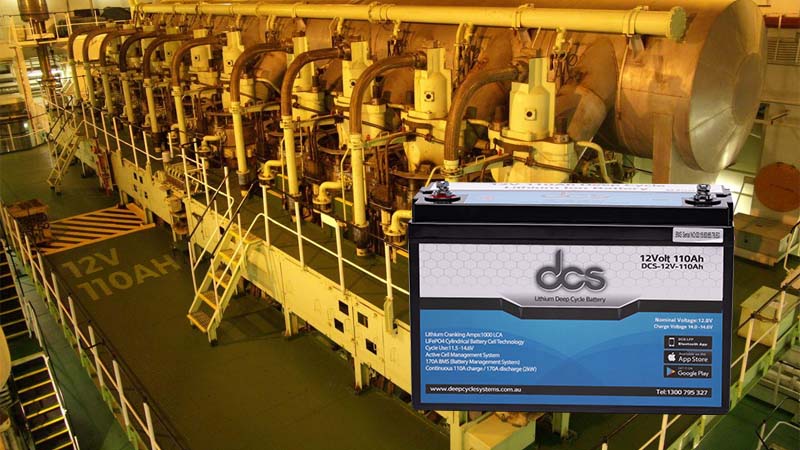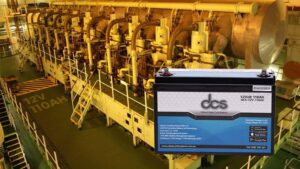Having a reliable Ship Battery is essential for any boater. Unfortunately, if the battery isn’t properly cared for and maintained, you may find yourself stranded in the middle of the lake or the ocean. To prevent this from happening, it’s important to make sure your boat battery has enough extra power to get you back to shore safely. In this blog post, we’ll discuss why having extra power for your boat battery is so important and how you can ensure that your boat battery is always ready to go.
The Importance of Having Reliable Boat Battery
Having a reliable boat battery is crucial for any boater. Whether you’re enjoying a day out on the lake or embarking on an extended voyage, your boat battery is what powers your boat’s engine, lights, and other electrical systems. Without a dependable battery, you run the risk of being stranded in the middle of the water, unable to navigate or even call for help.
Reliability is key when it comes to boat batteries because you need to be able to count on it to start your engine every time you turn the key. Additionally, a reliable battery ensures that you have power for all your onboard systems, including your GPS, fish finder, and radio. It’s not just about convenience; it’s about safety.
Why You Need Extra Power of lithium boat battery
Your boat battery is the lifeblood of your vessel, providing power to everything from the engine to the onboard electronics. But why is having extra power so crucial? Well, imagine this scenario: you’re out on the water, enjoying a beautiful day of boating when suddenly your battery dies. Without any extra power, you’re left stranded, unable to navigate or even call for help.
Having extra power for your lithium boat battery is like having a safety net. It ensures that even if your battery starts to run low, you still have enough power to get back to shore safely. This is especially important for longer trips or when you’re venturing into unfamiliar waters.
But it’s not just about avoiding being stranded. The extra power also gives you peace of mind. It means you can fully enjoy your time on the water, knowing that you have a reliable source of power that won’t leave you high and dry.
Potential Hazards of Power Loss
Having a power loss on your boat can lead to a variety of potential hazards that can quickly turn a fun day on the water into a dangerous situation. One major hazard is being left stranded without the ability to navigate or call for help. Without power, you lose control over your boat’s steering and propulsion, making it difficult to maneuver and get back to shore. This is especially concerning if you’re in a busy waterway or adverse weather conditions.
Another hazard of power loss is the loss of essential onboard systems. Without power, you may lose access to important electronics such as your GPS, fish finder, and radio, making it challenging to communicate with others or find your way back to safety. This can be especially dangerous in unfamiliar waters or during an emergency.
Additionally, power loss can also lead to issues with other safety equipment, such as bilge pumps and navigation lights. These are essential for keeping your boat afloat and visible to other boaters, and without power, you’re at risk of not being seen or experiencing flooding on your boat.
The Potential Risks of Insufficient Power
Having insufficient power for your Ship Battery can lead to a range of potential risks that can quickly turn a day of boating into a nightmare. One of the major risks is being stranded without the ability to navigate or call for help. Without power, you lose control over your boat’s steering and propulsion, leaving you at the mercy of the elements and unable to get back to shore.
In addition, insufficient power can result in the loss of essential onboard systems such as GPS, fish finders, and radios, making it challenging to communicate with others or find your way back to safety. This can be particularly dangerous if you’re in unfamiliar waters or during an emergency.
Furthermore, insufficient power can also impact other safety equipment, including bilge pumps and navigation lights. These are crucial for keeping your boat afloat and visible to other boaters, and without power, you risk not being seen or experiencing flooding on your boat.
Maximizing Battery Performance with Simple Upgrades
When it comes to your Ship Battery, maximizing its performance is essential for ensuring that you have the extra power you need on the water. Luckily, there are some simple upgrades you can make to get the most out of your battery.
One of the easiest ways to improve battery performance is by using a battery charger that has a smart charging feature. These chargers are designed to deliver the right amount of power to your battery, preventing overcharging and extending its lifespan. Additionally, using a charger with a maintenance mode can help keep your battery in top condition during periods of inactivity.
Another upgrade to consider is investing in a battery monitor. This device allows you to keep track of your battery’s voltage, current, and overall health, giving you a clear picture of its performance. With this information, you can make adjustments as needed and ensure that your battery is always ready to go.
Benefits of Extra Power for Your Ship Battery
Having extra power for your Ship Battery comes with a multitude of benefits that can greatly enhance your boating experience. First and foremost, having that extra power provides a sense of security and peace of mind. Knowing that you have a reliable source of power on board allows you to fully enjoy your time on the water without the constant worry of running out of battery.
Having extra power also opens up more opportunities for exploration and adventure. With a battery that can handle longer trips, you can confidently venture into unfamiliar waters or take on longer voyages. This flexibility gives you the freedom to discover new destinations and make lasting memories.
Additionally, having extra power means that you can power more devices and accessories on your boat. Whether it’s a powerful fish finder, a state-of-the-art GPS, or a high-quality sound system, having the extra power ensures that you can use all the equipment you need to enhance your boating experience.
Lastly, having extra power can also extend the lifespan of your battery. By not constantly draining it to its maximum capacity, you reduce the strain on the battery, allowing it to last longer and perform better over time.
Types of Batteries to Consider for Your Boat
When it comes to choosing the right battery for your boat, there are a few options to consider. One of the most common types of batteries is the lead-acid battery, which is known for its affordability and reliability. These batteries are available in two main forms: flooded lead-acid (FLA) and valve-regulated lead-acid (VRLA). FLA batteries require regular maintenance, such as checking the water levels and adding distilled water as needed. VRLA batteries, on the other hand, are maintenance-free and are designed to be leak-proof.
Another type of battery to consider is the lithium-ion battery. These batteries are lightweight and have a higher energy density, meaning they can store more power in a smaller size. They also have a longer lifespan and require less maintenance compared to lead-acid batteries. However, they tend to be more expensive upfront.
Gel batteries are another option to consider. These batteries use a gel electrolyte that immobilizes the acid, making them spill-proof and vibration-resistant. They also have a longer lifespan and are more resistant to deep discharges compared to traditional lead-acid batteries.
Maintenance Tips for Your Ship Battery
Proper maintenance is key to ensuring that your Ship Battery remains reliable and performs at its best. Here are some essential maintenance tips to keep in mind:
- Regularly inspect your battery: Check for any signs of damage or corrosion on the battery terminals. Clean the terminals with a mixture of baking soda and water to remove any build-up.
- Monitor water levels: If you have a flooded lead-acid battery, it’s important to regularly check the water levels. Add distilled water as needed to keep the plates submerged. Be careful not to overfill.
- Charge your battery properly: Use a smart battery charger that delivers the right amount of power and prevents overcharging. Avoid using quick chargers or trickle chargers, as they can damage the battery.
- Store your battery correctly: If you’re storing your boat for an extended period, remove the battery and store it in a cool, dry place. Make sure to charge it fully before storing and check it periodically to maintain its charge.
- Keep your battery clean: Regularly clean the battery and terminals with a battery terminal cleaner or a mixture of baking soda and water. This helps prevent corrosion and ensures a good connection.
FAQs
Have some questions about boat batteries and the importance of extra power? We’ve got you covered. Here are some frequently asked questions to help clear up any confusion:
1. Can I use a car battery for my boat?
While car batteries and boat batteries may look similar, they are not interchangeable. Boat batteries are specifically designed to withstand the unique demands of marine environments, including vibration, impact, and water exposure. Using a car battery in a boat could lead to poor performance, shorter lifespan, and potentially dangerous situations.
2. How do I know if my Ship Battery is fully charged?
You can use a battery monitor or a multimeter to check the voltage of your Ship Battery. A fully charged battery typically reads around 12.6 volts or higher. It’s important to note that different battery types may have different voltage ranges, so refer to the manufacturer’s specifications for accurate readings.
3. How long should my Ship Battery last?
The lifespan of a Ship Battery depends on various factors, including usage, maintenance, and the type of battery. Generally, lead-acid batteries last between 3-5 years, while lithium-ion batteries can last up to 10 years or more. Proper maintenance and regular charging can help prolong the life of your battery.
Conclusion
In summary, having extra power for your Ship Battery is essential for a worry-free and safe boating experience. It ensures that you won’t be left stranded in the middle of the water without the ability to navigate or call for help. By prioritizing extra power, you can avoid potential hazards such as loss of control, loss of essential onboard systems, and issues with safety equipment.
| Other Good Articles to Read |
| Blogs Rain |
| Cme Blog Spot |
| Garcias Blogs |
| Yyc Blogs |
| Guiade Blogs |
| Blogs-Hunt |
| Impact-Blog |
| Smarty Blogs |
| Ed Blog |
| Mo Blogs |
| Blogs Em |
| Blogs T |



